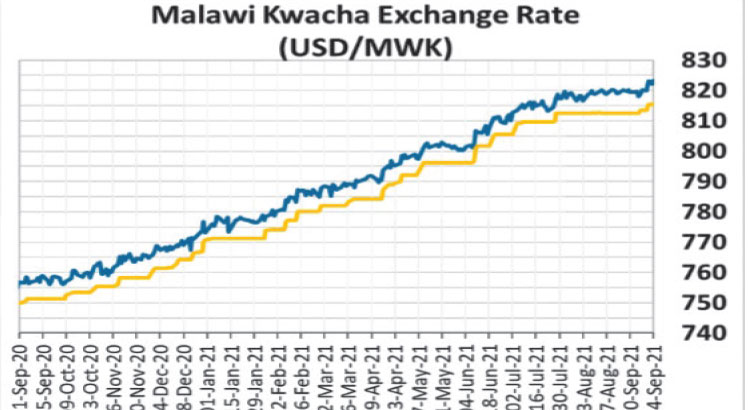
Kwacha to close year at K829/dollar—EIU

The Economist Intelligence Unit (EIU) has projected that the kwacha could depreciate further to close the year at K829.8 to the dollar largely due to the widening current account deficit.
The forecast by EIU, a firm within the Economist Group which provides forecasting and advisory services, comes at a time the kwacha has continued to depreciate throughout the year.
Reads EIU’s forecast quoted in the monthly economic report by Nico Asset Managers Limited: “The EIU expects that the kwacha will depreciate further as the large current account deficit will exert downward pressure on the kwacha throughout the forecast period.”
“The average value of the kwacha is, therefore, expected to weaken from K807.9 to a dollar to K927.4 to a dollar by 2025.”
Analysts say the decline in the value of the kwacha results in an increased import bill for strategic commodities such as fuel, fertiliser and pharmaceuticals.
In Malawi, the current account deficit has traditionally been large, averaging just under 19 percent of the gross domestic product (GDP) on account of a large merchandise trade deficit, owing to Malawi’s dependence on fuel and capital imports, according to EIU data.
The country’s current account deficit in June this year stood at $1.4 billion (about K1.1 trillion) representing 12.7 percent of the GDP due to worsening of goods account by 3.1 percent to $1.78 billion (about K1.4 trillion).
Meanwhile, Reserve Bank of Malawi (RBM) has also projected continued pressure on the kwacha on account of the excess demand for foreign exchange on the market.
RBM Governor Wilson Banda is on record as having said the central bank is looking at arranging facilities with regional and international banks to provide the country with short-term liquidity in foreign currency to stabilise the kwacha.
In an earlier interview, Financial Market Dealers Association of Malawi president Mclewen Sikwese said the kwacha continues to suffer from both supply and demand misalignment and speculative element due to the lack of confidence in the future value of the local unit.
“The country, therefore, needs to build liquid foreign exchange reserves of import cover position and using them to supply the foreign exchange market with foreign currency,” he said.
Cumulatively, as of October 1, the kwacha depreciated against all major trading currencies, losing K30.77 in value against the dollar, K30.66 against the pound, K71.40 against the euro and K2.75 against the rand.
On the other hand, RBM figures show that the gross official forex reserves have since fallen from $604.50 million, which is an equivalent 2.42 months of import cover in August to $521.87 an equivalent of 2.09 months of import cover in September.
SOURCE: THE TIMES